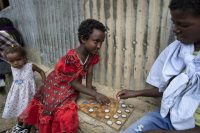
10 Conflicts to Watch in 2023. Ethiopia
One of 2022’s deadliest wars, in and around Ethiopia’s Tigray region, has for now ground to a halt. Two of the main belligerents – Ethiopian Prime Minister Abiy Ahmed’s government and the Tigray People’s Liberation Front (TPLF), which dominated Ethiopian politics for decades before Abiy assumed power in 2018 and then fell out with him – signed a deal on 2 November in Pretoria, South Africa, and, 10 days later, a follow-up agreement in Nairobi. But the calm is fragile. Key questions remain unsettled, notably whether Tigray’s forces will disarm and whether Eritrean President Isaias Afwerki, whose army has been fighting alongside Ethiopian troops, will withdraw his troops to the internationally recognised border.… Seguir leyendo »






